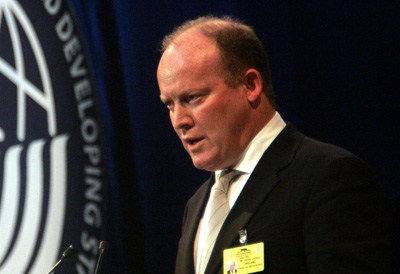Miscellaneous
Published: The Guardian CiF September 17 2010Why did Ireland’s science minister agree to launch an anti-evolution book?

The decision, since reversed, by Ireland’s minister for science, Conor Lenihan, to speak at the launch of a book that condemns evolution as a hoax is a damning and depressing indictment of Irish politics. But not, perhaps, for the reason readers might expect. John J May, the author of The Origin of Specious Nonsense, believes that evolution “cripples sanity, promotes myth and obscures reality”. Anyone who teaches evolutionary theory, he says, is “either ignorant or deliberately suppressing the known scientific facts”. Most of May’s arguments are so preposterous as to defy serious scrutiny. In a YouTube video posted to his site, he says:
They say we used to live up in trees. Well folks, climb a tree and live there for a week, and see how you feel. They also say we came out of the sea. Eh? If you lie in your bath for nine hours your skin is so wrinkled it’s not [sic] hardly recognisable. Yet a baby can be in a womb nine months in liquid without drowning, and when it’s born it’s not particularly wrinkled.
That a minister for science should think it appropriate to endorse such hilarious (and unscientific) hokum is obviously outrageous. Ireland is still viewed by some as a country with an overly strong attachment to Christian dogma. But it would be wrong to assume that the minister was pandering to an undercurrent of creationist-inspired anti-evolutionary feeling among voters here. Despite falling mass attendances, Ireland remains a Catholic country. And the Catholic Church has never taken a strong position against evolution.
In Ireland, our dwindling band of religious fundamentalists opposed the legalisation of homosexuality and divorce. They remain fiercely opposed to any liberalisation of the law on abortion. But on the subject of evolution they have been mostly silent.
Besides, as the former editor of a sex magazine called SIN, John J May cannot be what anyone would call a prude. He describes himself as “like Abraham Lincoln, self educated, and might be viewed as a polymath. [I] left school young and commenced my real education.” I took part in a television discussion with him last year and felt that I had never before encountered a man whose self-confidence was so wildly out of proportion to his erudition. He is, to put it bluntly, a crank.
So why on earth did Lenihan agree to launch his book? In his only public statement, the minister’s spokesperson claimed that he had only planned to attend in his capacity as May’s local TD and that he did not necessarily agree with the book’s central thesis (such as it is.) That would mean that he did not see (or perhaps was not even aware of) any conflict between his duties as the country’s minister for science and the endorsement of such a profoundly unscientific book.
It would be nice to say that the spokesperson was definitely bending the truth here, and that the minister couldn’t possibly have been so stupid. But I would hesitate to do so in this instance.
It’s no secret that Lenihan is one of Dáil Éireann’s less highly evolved thinkers. In 2005, he famously referred to exploited Turkish construction workers as “kebabs” during a Dáil debate. (To get the reaction of the Turkish community, the equally cerebral and culturally sensitive TV3 News visited a kebab shop and interviewed a man making a kebab!)
But there are two other points to be made to put the minister’s decision in context. Firstly, there is the local nature of Irish politics. Ireland has 166 members of parliament representing a country of less than 4.5 million people. That’s one TD for about every 26,000 people. So it is expected that TDs will be available to their constituents in way that would not be common in other countries. While he was a TD for Sligo-Leitrim in the 1970s, my late grandfather was once asked to collect a greyhound in Athlone on his way home from a Dáil session and deliver it to a constituent. (He refused.)
The second important thing to understand is that Lenihan is steeped in the traditions of Fianna Fáil. Like the Chinese communist party, Fianna Fáil has long since jettisoned whatever principles and ideals it was founded upon. Today, its only raison d’être is the pursuit and consolidation of it’s own power.
As far as this preposterous book goes then, the only consideration likely to have weighted on Lenihan’s mind is whether helping to launch it would help garner a few extra votes for him at the next election. When it seemed that it might, he agreed to help. When he realised that it wouldn’t, he withdrew. It was gombeen politics, nothing more.
[N.B. This article got over two hundred comments when it was published here this morning. Some of them accused me of being anti-Irish. You know, I don’t think I am – but it would explain a lot.]
